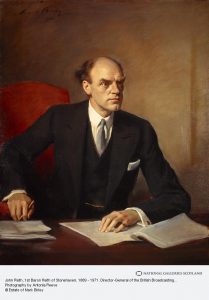Auntie the Apostate; Losing Her Religion
by David Robertson, theweeflea:
Chapter Five of The Noble Liar is entitled “Auntie the Apostate: Losing Her Religion” . It is incredibly insightful and helpful. The following is a summary with some of the best quotes. Read and think about this. We have moved from the BBC broadcasting CS Lewis during a time of crisis, to the BBC now promoting the secular prophet, Richard Dawkins. It has not been a change for the better.
The Christian Foundations of the BBC
 John Reith, the first director-general of the BBC was born in 1889. He was the son of a Presbyterian minister and throughout his long life (he died in 1971) he never publicly deviated from support for a conventional Christian morality, and he carried the same moral high-mindedness into his work at the BBC. Reith had a vision of the BBC as fulfilling a higher public purpose and ensured that broadcasting in the UK took a quite different trajectory than in other countries.
John Reith, the first director-general of the BBC was born in 1889. He was the son of a Presbyterian minister and throughout his long life (he died in 1971) he never publicly deviated from support for a conventional Christian morality, and he carried the same moral high-mindedness into his work at the BBC. Reith had a vision of the BBC as fulfilling a higher public purpose and ensured that broadcasting in the UK took a quite different trajectory than in other countries.
He wanted the BBC to be seen as an instrument of moral improvement rather than being dominated by commercial concerns. The BBC’s earliest corporate character was to be “serious minded, consciously aligned with traditional Christian morality and conscious also obvious obligation to be fair.” (P.121).
C S Lewis
 It is always difficult to tell the truth in a balanced way– especially when you are at war, as Britain was during the Second World War. Overall the BBC came through the Second World War with its reputation greatly enhanced. During that period they broadcast a series of remarkable talks by CS Lewis. There were 33 short talks broadcast in 1942, 1943 and 1944. These were published in book form in 1952 as Mere Christianity – probably one of the greatest Christian books ever written. It is impossible to conceive of the BBC allowing such a production today.
It is always difficult to tell the truth in a balanced way– especially when you are at war, as Britain was during the Second World War. Overall the BBC came through the Second World War with its reputation greatly enhanced. During that period they broadcast a series of remarkable talks by CS Lewis. There were 33 short talks broadcast in 1942, 1943 and 1944. These were published in book form in 1952 as Mere Christianity – probably one of the greatest Christian books ever written. It is impossible to conceive of the BBC allowing such a production today.
Whilst the BBC were happy to broadcast these talks, some of Lewis’s contemporaries in Oxford were not. They regarded him as some kind of academic heretic for believing in God. In 1951 one don voted against Lewis been granted the prestigious poetry chair precisely because he had written works of popular theology. Lewis lost by 194 to 173.





